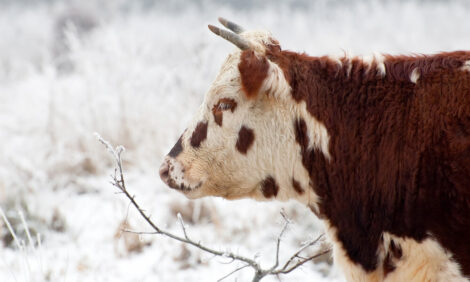



Nebraskan Economy Develops as Dairy Expands
LINCOLN, US — Business, infrastructure and more will profit from an expanding dairy industry in Nebraska, according to a University of Nebraska-Lincoln dairy specialist.The increase in cow numbers will help provide milk for Nebraska's 13 dairy plants, as well as boost the economy and state's infrastructure, said Jeff Keown.
Keown has studied the particulars of dairy expansion in Nebraska, and provides information to business people on the amenities Nebraska can offer animal agriculture.
* "Milk no longer is a local commodity – it's a national commodity." |
|
Jeff Keown, University of Nebraska-Lincoln dairy specialist.
|
Take, for example, dairyman Dan Rice, who moved to Nebraska from Pennsylvania about seven years ago.
"We're extremely happy with how it has worked out," said Rice, owner in the family-operated Prairieland Dairy LLC, a 2,000-dairy cow operation near Firth. The dairy is the site of an annual open house, this year June 28.
"We feel the next generation is far removed from the farm," Rice said. Inviting the public to visit Prairieland may better help people understand where their food comes from and how animals are cared for. "All we do is for the benefit of the animal," he added.
Prairieland produces skim, 2 percent, chocolate and A2 milk, which is derived from a certain protein produced only by certain cows and is similar to goat's milk. A2 milk is more easily digested by some people.
Prairieland milk is bottled in corn-based PLA plastic bottles, which Rice said can be composted. Prairieland manure also is composted and sold to landscapers and homeowners.
"We try to be good neighbors," said Rice, who is board of directors president for the Nebraska Dairy Industries Association. The NDIA is an information clearinghouse comprising agencies and commodity groups to help dairy interests learn what is needed to locate or expand animal agriculture in Nebraska. Its members can provide information such as what to expect from various zoning boards in the state, or even accompany an individual when he or she speaks to zoning boards.
Among Nebraska amenities attractive to the dairy industry are water, corn, alfalfa, ethanol plants with distillers grains byproducts for feed, and its central location on Interstate 80, two days from either coast.
Location, Keown said, is important because "milk no longer is a local commodity – it's a national commodity."
In addition to providing milk for processing, an expanding dairy industry can help boost the economy with jobs, infrastructure and taxes.
In Nebraska, Keown said a 500-cow dairy is a $2 million to $3 million investment, plus the per cow cost of $3,000 to $4,000. One worker is required to care for every 100 cows, with wages providing livelihoods as well as paying taxes, and supporting schools, infrastructure and businesses such as semen sales personnel and large-animal veterinarians.
TheCattleSite News Desk


